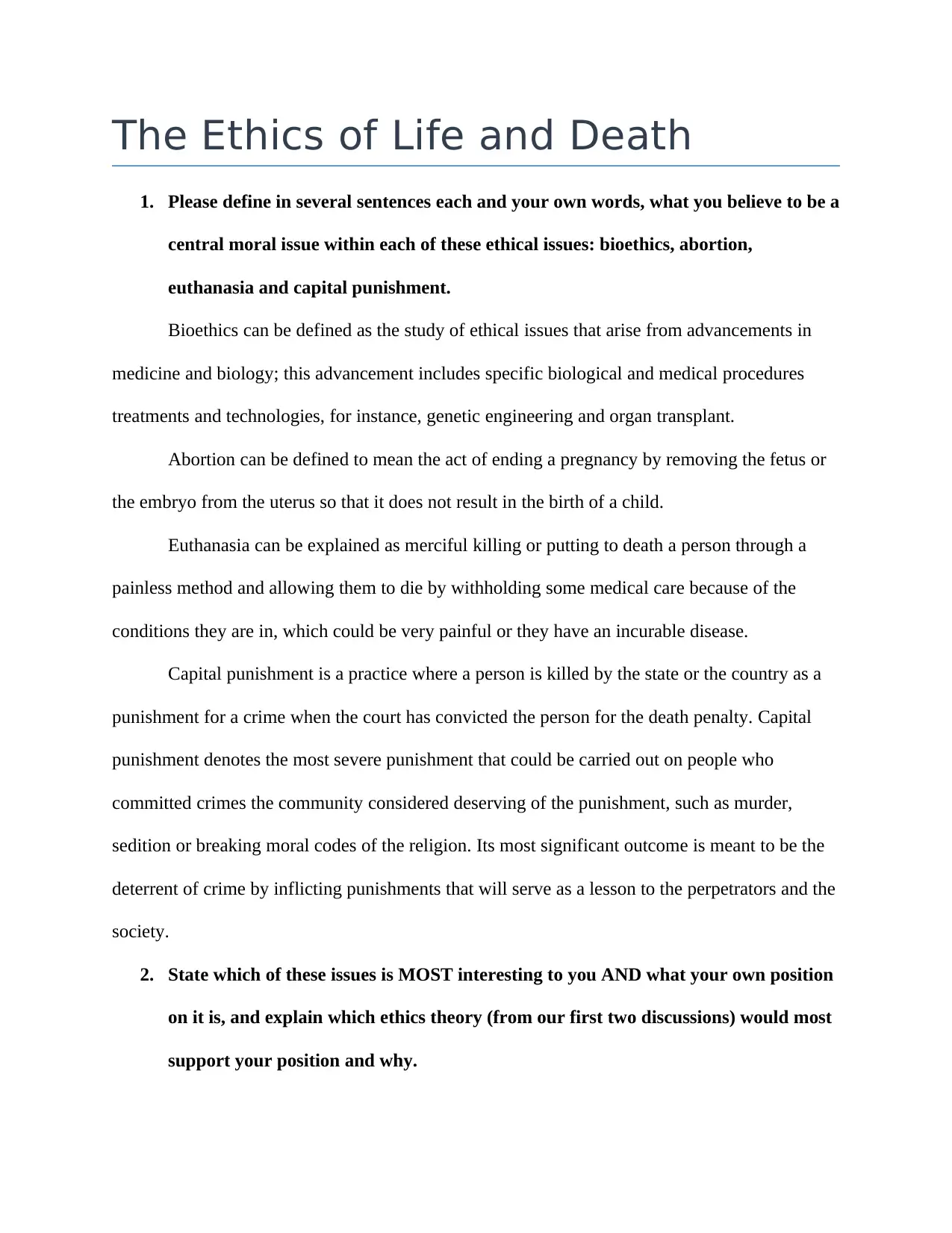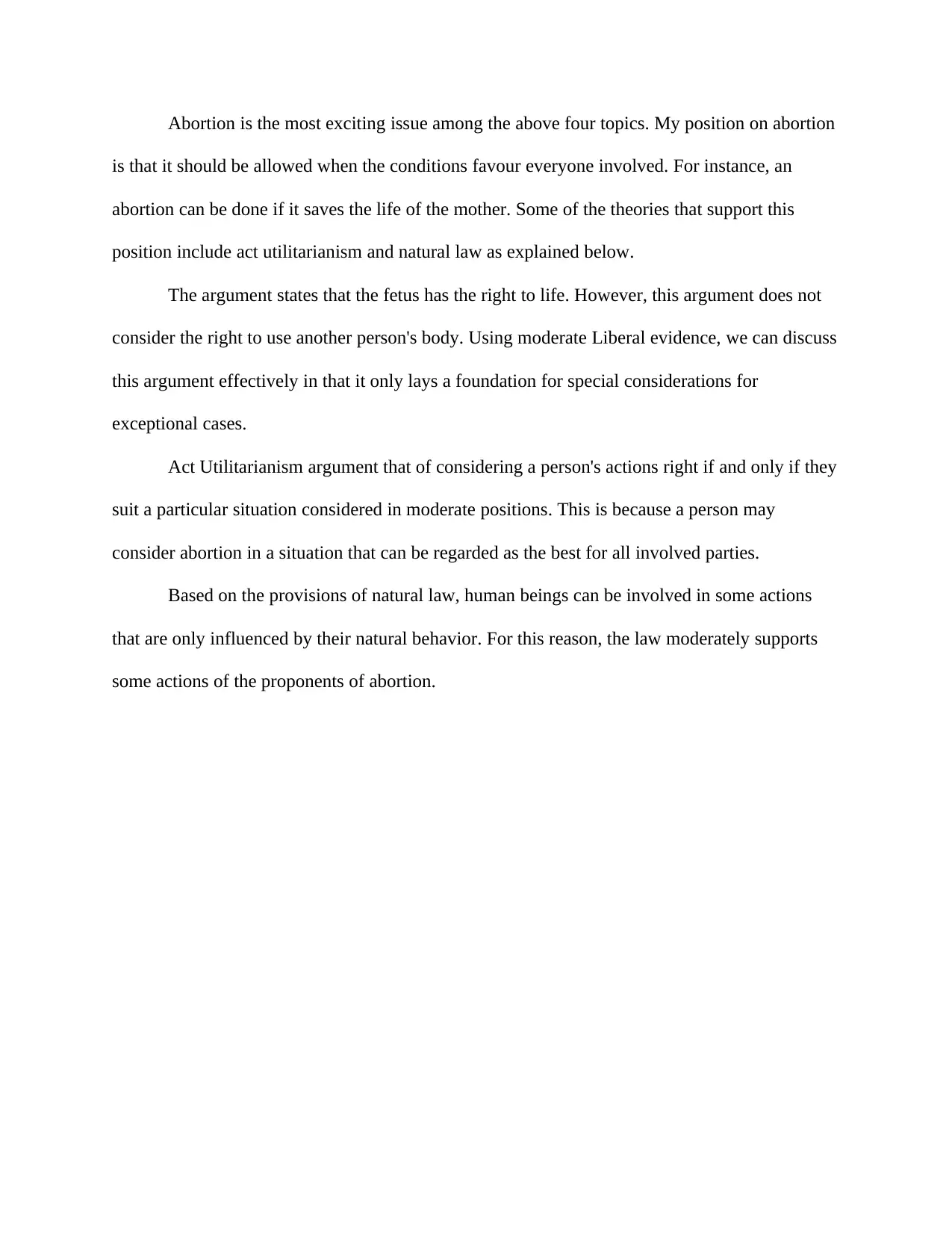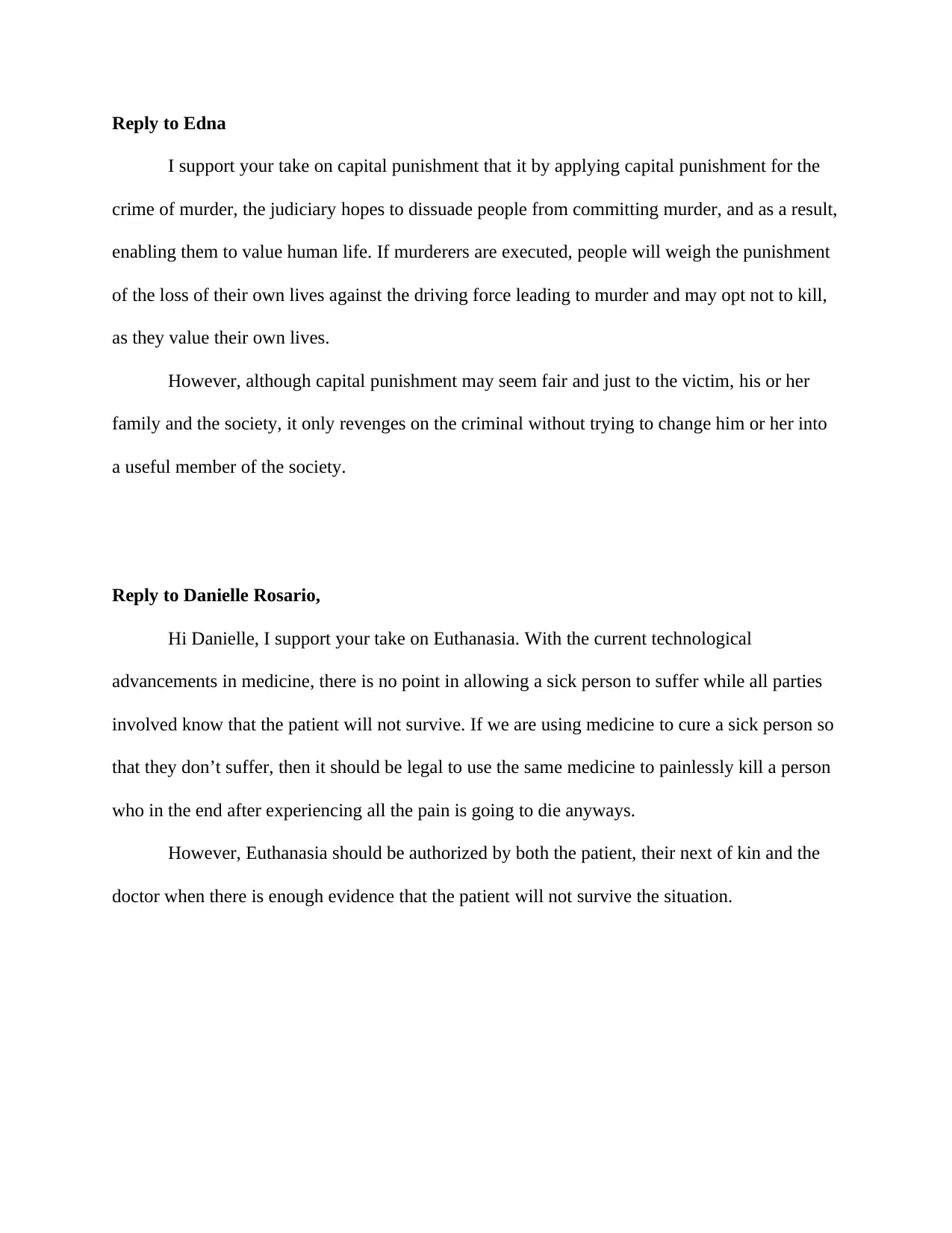Ethics: Bioethics, Abortion, Euthanasia, and Capital Punishment
VerifiedAdded on 2022/08/24
|3
|760
|12
Homework Assignment
AI Summary
This assignment delves into the ethical considerations surrounding bioethics, abortion, euthanasia, and capital punishment. The student defines each concept, identifies central moral issues, and expresses a personal stance on abortion, supported by act utilitarianism and natural law. The assignment also includes responses to classmates' viewpoints on capital punishment and euthanasia, showing agreement and further elaborating on the ethical complexities of each topic. The student's analysis considers the rights of the fetus, the role of individual actions in ethical decision-making, and the influence of natural behaviors on law.

The Ethics of Life and Death
1. Please define in several sentences each and your own words, what you believe to be a
central moral issue within each of these ethical issues: bioethics, abortion,
euthanasia and capital punishment.
Bioethics can be defined as the study of ethical issues that arise from advancements in
medicine and biology; this advancement includes specific biological and medical procedures
treatments and technologies, for instance, genetic engineering and organ transplant.
Abortion can be defined to mean the act of ending a pregnancy by removing the fetus or
the embryo from the uterus so that it does not result in the birth of a child.
Euthanasia can be explained as merciful killing or putting to death a person through a
painless method and allowing them to die by withholding some medical care because of the
conditions they are in, which could be very painful or they have an incurable disease.
Capital punishment is a practice where a person is killed by the state or the country as a
punishment for a crime when the court has convicted the person for the death penalty. Capital
punishment denotes the most severe punishment that could be carried out on people who
committed crimes the community considered deserving of the punishment, such as murder,
sedition or breaking moral codes of the religion. Its most significant outcome is meant to be the
deterrent of crime by inflicting punishments that will serve as a lesson to the perpetrators and the
society.
2. State which of these issues is MOST interesting to you AND what your own position
on it is, and explain which ethics theory (from our first two discussions) would most
support your position and why.
1. Please define in several sentences each and your own words, what you believe to be a
central moral issue within each of these ethical issues: bioethics, abortion,
euthanasia and capital punishment.
Bioethics can be defined as the study of ethical issues that arise from advancements in
medicine and biology; this advancement includes specific biological and medical procedures
treatments and technologies, for instance, genetic engineering and organ transplant.
Abortion can be defined to mean the act of ending a pregnancy by removing the fetus or
the embryo from the uterus so that it does not result in the birth of a child.
Euthanasia can be explained as merciful killing or putting to death a person through a
painless method and allowing them to die by withholding some medical care because of the
conditions they are in, which could be very painful or they have an incurable disease.
Capital punishment is a practice where a person is killed by the state or the country as a
punishment for a crime when the court has convicted the person for the death penalty. Capital
punishment denotes the most severe punishment that could be carried out on people who
committed crimes the community considered deserving of the punishment, such as murder,
sedition or breaking moral codes of the religion. Its most significant outcome is meant to be the
deterrent of crime by inflicting punishments that will serve as a lesson to the perpetrators and the
society.
2. State which of these issues is MOST interesting to you AND what your own position
on it is, and explain which ethics theory (from our first two discussions) would most
support your position and why.
Paraphrase This Document
Need a fresh take? Get an instant paraphrase of this document with our AI Paraphraser

Abortion is the most exciting issue among the above four topics. My position on abortion
is that it should be allowed when the conditions favour everyone involved. For instance, an
abortion can be done if it saves the life of the mother. Some of the theories that support this
position include act utilitarianism and natural law as explained below.
The argument states that the fetus has the right to life. However, this argument does not
consider the right to use another person's body. Using moderate Liberal evidence, we can discuss
this argument effectively in that it only lays a foundation for special considerations for
exceptional cases.
Act Utilitarianism argument that of considering a person's actions right if and only if they
suit a particular situation considered in moderate positions. This is because a person may
consider abortion in a situation that can be regarded as the best for all involved parties.
Based on the provisions of natural law, human beings can be involved in some actions
that are only influenced by their natural behavior. For this reason, the law moderately supports
some actions of the proponents of abortion.
is that it should be allowed when the conditions favour everyone involved. For instance, an
abortion can be done if it saves the life of the mother. Some of the theories that support this
position include act utilitarianism and natural law as explained below.
The argument states that the fetus has the right to life. However, this argument does not
consider the right to use another person's body. Using moderate Liberal evidence, we can discuss
this argument effectively in that it only lays a foundation for special considerations for
exceptional cases.
Act Utilitarianism argument that of considering a person's actions right if and only if they
suit a particular situation considered in moderate positions. This is because a person may
consider abortion in a situation that can be regarded as the best for all involved parties.
Based on the provisions of natural law, human beings can be involved in some actions
that are only influenced by their natural behavior. For this reason, the law moderately supports
some actions of the proponents of abortion.

Reply to Edna
I support your take on capital punishment that it by applying capital punishment for the
crime of murder, the judiciary hopes to dissuade people from committing murder, and as a result,
enabling them to value human life. If murderers are executed, people will weigh the punishment
of the loss of their own lives against the driving force leading to murder and may opt not to kill,
as they value their own lives.
However, although capital punishment may seem fair and just to the victim, his or her
family and the society, it only revenges on the criminal without trying to change him or her into
a useful member of the society.
Reply to Danielle Rosario,
Hi Danielle, I support your take on Euthanasia. With the current technological
advancements in medicine, there is no point in allowing a sick person to suffer while all parties
involved know that the patient will not survive. If we are using medicine to cure a sick person so
that they don’t suffer, then it should be legal to use the same medicine to painlessly kill a person
who in the end after experiencing all the pain is going to die anyways.
However, Euthanasia should be authorized by both the patient, their next of kin and the
doctor when there is enough evidence that the patient will not survive the situation.
I support your take on capital punishment that it by applying capital punishment for the
crime of murder, the judiciary hopes to dissuade people from committing murder, and as a result,
enabling them to value human life. If murderers are executed, people will weigh the punishment
of the loss of their own lives against the driving force leading to murder and may opt not to kill,
as they value their own lives.
However, although capital punishment may seem fair and just to the victim, his or her
family and the society, it only revenges on the criminal without trying to change him or her into
a useful member of the society.
Reply to Danielle Rosario,
Hi Danielle, I support your take on Euthanasia. With the current technological
advancements in medicine, there is no point in allowing a sick person to suffer while all parties
involved know that the patient will not survive. If we are using medicine to cure a sick person so
that they don’t suffer, then it should be legal to use the same medicine to painlessly kill a person
who in the end after experiencing all the pain is going to die anyways.
However, Euthanasia should be authorized by both the patient, their next of kin and the
doctor when there is enough evidence that the patient will not survive the situation.
⊘ This is a preview!⊘
Do you want full access?
Subscribe today to unlock all pages.

Trusted by 1+ million students worldwide
1 out of 3
Related Documents
Your All-in-One AI-Powered Toolkit for Academic Success.
+13062052269
info@desklib.com
Available 24*7 on WhatsApp / Email
![[object Object]](/_next/static/media/star-bottom.7253800d.svg)
Unlock your academic potential
Copyright © 2020–2026 A2Z Services. All Rights Reserved. Developed and managed by ZUCOL.





